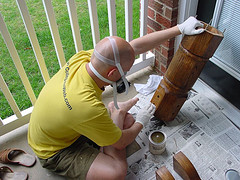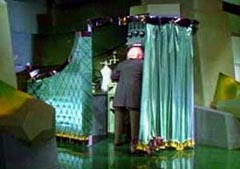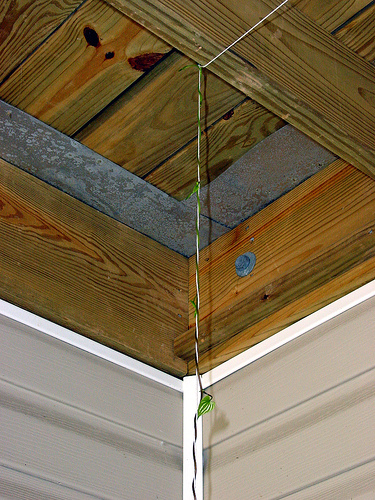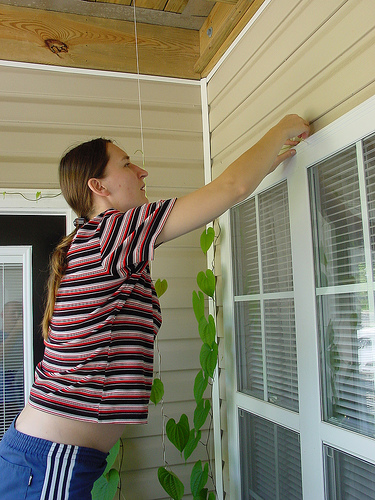Vine Update
The back-porch vine — a potato-something — has been growing at Jack-and-the-Bean-Stalk-ian proportions.
It literally grows a measurable length every every day.
It’s difficult to tell, but the middle vine has already, within a week, reached the bottom of our neighbor’s deck — our “roof,” I suppose — and will soon be snaking its way across, eventually to drop down to the banistar and begin weaving in and out of its rails. At least that’s how we’ve run the guide wire.
Redundancy
Fair Game
Someone could kidnap me, blindfold me, and drive me to the parking lot, and I’d know within seconds where I was. All I’d have to do is look at one car’s tail end — the excessive number of bumper stickers would tell me one thing: I’m in Earth Fare‘s parking lot.
Organic is trendy, there’s no doubt about it. After all, there are only so many people who can afford to do all their shopping at a place where four bags of groceries can cost you $202, as it did with the couple ahead of me this afternoon. When you pull park your car, you’ll notice that the number of cars completely plastered over with bumper stickers is rivaled only by the number of Lexuses (Lexi?), Mercs, and assorted vehicles that probably cost more per month to insure than I pay for my monthly rent.
Still, stores like The Good Life and Earth Fare ideally cater to their original, dreadlocked clientele. That’s why there’s a balding, middle-aged banker or accountant — white collar for sure — outside the entrance playing pseudo-Eastern tunes on a recorder, with a henna woman set up right across from him. Even one of the managers has dreads to his waist and a Talmudic beard.
It’s all so, so, earthy.
Conspicuously earthy.
That’s why I don’t like it.
Every time I’m too lazy to go downtown to the one good bakery in the whole city, I stop off at Earth Fare to buy a four dollar loaf of bread. And I can’t help but as if feel everyone’s acting. As if the majority of the people are shopping there to be seen shopping there.
Organic beer that costs nine bucks for a six pack. Organic beef that vegetarians buy for their dogs — I’ve heard them admitting it, as if they’re almost worried that someone might think, “Oh, what a cretin, eating meat” — that costs an absurd amount per pound. Organic everything. Vegan everything. Vegan beer.
I’m just waiting for the vegan parking lot.
Breakfast with Audrey
We watched Breakfast at Tiffany’s last night — first time for me.
When Paul gets out of the cab in his first appearance, I could only think of one thing: Henry Mancini directing a mellow arrangement of the A-Team theme…
Recent Listening: Gender Grammar and Names
“Who cares about grammar?” some ask. That devil-may-care attitude I suppose works for some. There are a few jobs were clarity seems critical. “Spiritual leader” seems to be just such a job.”
Yet, uneducated preachers, it seems to me, are the ones most likely to follow a line of thinking like this: “My job is to communicate. If they understand me, then that’s all I care about.” You’d think if souls are on the line and all that a little more care might be in order. Apparently not.
Other times, grammatical goofs result in little more than humorously muddled texts.
The worst source of well-advertised, over-exposed bad grammar is the lyrics of popular songs. For instance, countless singers have used the subjective “I” instead of the objective “me” to make a rhyme. I guess that’s okay — it doesn’t really change the meaning.
The he/him and she/her difference, however, can make a huge impact on the song’s meaning. Consider two examples from songs I listened to recently.
First, “Hard to Handle,” the Alvertis Isbell/Allen Jones/Otis Redding song made famous by the Black Crowes:
Action speaks louder than words
And I’m a man of great experience
I know you’ve got another man
But I can love you better than him
Wiry Chris Robinson tried so hard to be masculinely sexy in that video, and it’s just difficult to imagine him deliberating between another man and some curvy groupie. But apparently, if the lyrics are to be believed, he did…
John Lennon did no better with the Beatles’ “If I Fell.” Weighing the advantages and disadvantages of two girls he’s interested in, much like I was checking tomatoes at the farmers’ market the other day, he tells one,
If I give my heart to you
I must be sure
From the very start
That you would love me more than her
Granted, it is a fantasy of a great many men to be with two women at once, but I don’t think Lennon had that in mind in penning this line. Or maybe he was thinking something along the lines of Chasing Amy.
In both instances, of course, the “lyricist” simply didn’t understand that they were writing elliptical statements. “I can love you better than he [can love you].” “You would love me more than [she would love me].”
Johnny Cash, however, had no such problems writing one of his best, “A Boy Named Sue.” The narrator’s father, just before skipping out on his responsibilities, names his son “Sue,” prompting the grown Sue to hunt him down. Just before his son shoots him, Sue’s father says,
“Son, this world is rough
And if a man’s gonna make it, he’s gotta be tough
And I knew I wouldn’t be there to help ya along.
So I give ya that name and I said goodbye
I knew you’d have to get tough or die
And it’s the name that helped to make you strong.”He said: “Now you just fought one hell of a fight
And I know you hate me, and you got the right
To kill me now, and I wouldn’t blame you if you do.
But ya ought to thank me, before I die,
For the gravel in ya guts and the spit in ya eye
Cause I’m the son-of-a-bitch that named you ‘Sue.'”
I want my children to have courage (though not necessarily such foolhardy courage), but I don’t think we’ll resort to naming our son Sue…
Table
My uncle had a little workshop behind my grandparents’ house, and he liked to work with wood. He made a few items, mostly from kits, I believe.
He made a table once, which he gave to my father. I grew up eating at it. And that thirty-odd years of eating, banging, scratching, and spilling took its toll.
The shine muted long ago, and the color itself was disappearing here and there. It was a functional table, but little else.
When my mother decided they needed a new table, my wife’s and my impending return served as the perfect excuse.
“They’ll need a table! We’ll give this one.”
K loved it immediately. Yet, on more than one occasion, she showed it was a strangely conditional love: “If only you could refinish it.” Though I’d never undertaken anything even remotely similar, it seemed an easy enough job.
It was. But time consuming. Not to mention irritating, literally.
First there was all the sanding, with the accompanying, irritating dust. Getting it to a “raw” state took a couple of afternoons of sanding.
Sanding with a rotary sander is an art, I discovered. Like so many things, it requires a bit of pressure, but not too much. It requires patience, and a willingness to go over the same area again and again. And again and again. In other sanding projects, I applied too much pressure too quickly. The results of that afternoon of sanding feel like a relief map of central Poland: a few little bumps, but mostly flat.
 Too much aggression and you wind up with scratch marks that are visible only with the first coat of stain. Which is why I had to start over with the table top itself — even 400 grit sand paper can leave unsightly marks if you go against the grain.
Too much aggression and you wind up with scratch marks that are visible only with the first coat of stain. Which is why I had to start over with the table top itself — even 400 grit sand paper can leave unsightly marks if you go against the grain.
Once the sanding is done, the only truly easy part: staining. I soon discovered that even when working outside, I am so sensitive to the chemicals wafting through the air that a respirator was an absolute necessity.
 After staining comes the real opportunity for true disaster: applying polyurethane. It certainly cannot be done outside. Polyurethane is a magnet for dust. If there’s no garage, a second bathroom is critical.
After staining comes the real opportunity for true disaster: applying polyurethane. It certainly cannot be done outside. Polyurethane is a magnet for dust. If there’s no garage, a second bathroom is critical.
Once everything was reassembled, the feeling of accomplishment gave a high nearly as good as the initial, respirator-less staining. A glistening, beautiful table where once a ragged piece of — let’s be honest — junk once stood.
“Oh, what a table,” I remind K from time to time. She looks up with a smile and says, “Yes, you did do a pretty good job.”
At least we’ll have something to pass on to our children…
The Myth of Sisyphus
 Camus was wrong: Sisyphus had it easy.
Camus was wrong: Sisyphus had it easy.
There’s little heroism in doing something when you know there’s no hope of success. Later critics called Camus’ creation “existentialism.” It’s really either stubbornness or stupidity. Or boredom. Whatever it was that kept Sisyphus rolling that boulder back up the hill, he suffered no delusions that this time would be different than any other time he’d done it. He pushed the stone up without any hope of success. Not even Camus’ modern re-creation of Sisyphus, Dr. Bernard Rieux, had any hope of curing any of his patients in The Plague.
Sisyphus and Rieux have the luxury of hopelessness.
Climbing Vines
We have a couple of plants that, in Little Shop of Horrors fashion, send out their long tentacles that wrap around just about anything.
The first plant is actually a pair, planted in an earthen pot out on our back patio. They’ve been climbing for some time, and one of the seed-like things (oh, I’m just too lazy to look up what it would be called) actually shot out two spouts.
We decided yesterday afternoon to rein them in a bit. Rather, like good parents, we tried not to force them to do anything they wouldn’t naturally do, and instead provided them with string to wrap themselves around. We guided them, in other words.
In still other words, we finally put up a third line for it, untangled the two that were sharing a previously installed guide line (i.e., a bit of string), and viola!
Oh, what parents we’re going to be!
Once everything was done, K decided the unruly plant in the computer/movie/guest room had to be tamed as well.
This time, K decided she wanted to do it herself. Rather, I was busy working on something else and she knew it would probably be easier just to do it herself. Rather, I turned up my nose at the suggestion of banging more nails into our poor walls and so K did it herself.
New Site
This site has been moved. If you’re just coming to “matchingtracksuits.com” you’ll have no problems.
RSS readers seem to be having a bit of a tough time coping, though.
Bread
Recent Reads
The funny thing about working as a contract technical writer/editor for a company that makes air and water purification systems is that you get excited about finding the most unimaginably dull titles in the local university library:
- Oxygen, Elementary Forms and Hydrogen Peroxide by Michael Ardon.
- Introduction to Atmospheric Chemistry by Daniel Jacob.
- Residential Air Quality and Energy Efficiency by Peter du Pont and John Morril.
- “Cryptosporidiosis-associated mortality following a massive waterborne outbreak in Milwaukee, Wisconsin” in American Journal of Public Health.
- Carpet Monsters and Killer Spores: A Natural History of Toxic Mold by Nicholas Money.
Learning Polish
From my journal, ten years ago.
I’ve been working with my host mother on the basic Polish sounds and I have hit a real break through in [the] pronunciation of sz and rz. It’s great!
Earlier in the evening I was trying to pronounce one of the many “sh” sounds and after several failures I finally threw out a last attempt accompanied by a significant amount of spittle, and she cried “Tak!” with great delight.
Learning Polish was unlike learning Spanish and French for me because it occurred in Poland out of necessity. Survival even. And so the result is that I know much more Polish than I ever did French or Spanish, and I have an understanding of linguistic subtitles that escaped me in high school and university.
And I can finally say “chrząszcz” without drowning my conversational companions.
“The New Polish Potatoes”
Ah, those Kaczynski boys, they’re a crazy pair:
[Prime Minister] Marcinkiewicz resigned just days after President Kaczynski, 57, canceled a “Weimar Triangle” summit meeting with Chancellor Angela Merkel of Germany and President Jacques Chirac of France.
These summit meetings were first started 15 years ago, soon after the collapse of the Soviet Union to forge closer political, economic and security ties between the three largest countries in the European Union but also to break down decades of suspicions and tension between Warsaw and Berlin.
Kaczynski’s office canceled the meeting with very short notice, officially because Kaczysnki had become ill. But senior Polish diplomats and opposition politicians said the real reason was a satirical article published in the German daily Taz newspaper that described the Kaczynski twins as “the Polish new potatoes.”
Anna Fotyga, Poland’s foreign minister, publicly complained to the German Foreign Ministry and demanded a formal apology. After Berlin said it would not comment since it supported freedom of the press, Fogyta said the lack of response was “shocking” and compared the article to the language used in Der Stürmer, a propaganda weekly during the Nazi era. Former foreign ministers accused the government of damaging Poland’s national interests. (IHT)
I think if this had happened during recess, the Leck or Jarek would have just smacked the editor.
Maybe that would have been less damaging for Polish foreign relations.
God in the Aisle
I sometimes go to Mass with my wife for companionship, and today, I was certainly glad I did. Before I get into the reason why, some theology.
Catholics of course believe in something they call the “Real Presence,” which is the belief that the bread and wine are the actual body and blood of Jesus. It’s based on an Aristotelian concept of accident and essence — what a thing looks like and what it really is. So the Catholic explanation of why it still looks suspiciously like bread and wine is that the outward appearance has remained, but the essential reality has changed.
This is why there’s all the genuflection in churches and especially before monstrances, because if that really is God in the flesh flour, then it only makes sense to bow.
This also goes a long way in explaining the controversy about how a parishioner can take the host: standing, kneeling, on the tongue, on the palm of the hand. I think the variety is strictly American. In Poland, the issue is vastly simplified: stand or kneel. There’s no way a priest will give it to your hand in Poland.
“Real Presence” also explains why some might be a little uneasy with the idea of anyone other than a priest handing out the host. In the States, members of the congregation hand out the blood and wine (though the priest has consecrated it and all that). Again, this is probably a completely American thing.
All this is to explain the significance of why I’ve always wondered what would happen if someone tripped and — whoosh — there’s God, all over the floor.
At this morning’s Mass, my question was answered.
An elderly woman, serving as Eucharistic minister, was heading back up to the altar (and so her chalices were probably almost empty) when suddenly there was a stumble, shuffle, and crash. I saw the whole thing out of the corner of my eye, and I immediately directed all my attention there — as did everyone else in the basilica.
The priest kept right ongoing, but not many people were giving him their undivided attention. Everyone was looking at the aisle, watching the lady pick up the hosts as another Eucharistic minister helped her. Then a deacon came with a cloth that had been dampened, I’m assuming with holy water, and wiped the spot.
The woman was obviously quite shaken. She said some words to the priest, and he sympathetically comforted her. Returning to her seat, she muttered something to her husband, and that was that.
It highlights how atypical Catholicism is in modern culture, where all sense of the sacred has disappeared. “And so much the better” many of us would add, but sacredness fosters a certain respect that I’m not sure you can get any other way. It’s simplistic to explain it, “Well of course it’s respect — born out of fear, a terror that some deity will toast you.” There’s certainly an element of truth in that.
Communism tried to foster some sense of the sacred — the working masses were the vessels for salvation. The working man is the communist messiah. Marches, songs, flag-waving, speeches — all these things to foster a sense of the sacred in the people. Yet it didn’t work. My wife grew up in that culture, and it was all a joke for everyone. Why?
 It lacked mystery.
It lacked mystery.
Without mystery, without an element of the unknown and inexplicable, nothing can be sacred. Indeed, sacredness could be defined as a sense of mystery about something thought to be of divine origin. If you see the little old man putting together the wizard show, hanging the curtains, preparing the control panel, it is only through an act of supreme wishful thinking that you can put your faith in the Wizard.
“Come on, just once!”
“Come on, Larry. Just once! Let’s just see if she’ll notice. I swear I won’t do anything with her.” How many twins have uttered something like that to their identical sibling, trying to convince the sibling to let him go on a date with his brother’s girlfriend?
What if the twins both held public office, only one was much higher in rank? Say Jeb and W were twins — wouldn’t you think that Jeb would try, just once, to convince his brother to let him make some kind of address as the president? “Come on, Georgie! We ain’t talkin’ about a State of the Union address. It’s just a little chat out in the Rose Garden. They’ll never notice!”
We’re fortunate that Jeb and W aren’t twins, because they seem just, well, lacking-in-seriousness enough to try it.
 Such a situation is not inconceivable in the near future in Poland, though. Prime Minister Kazimierz Marcinkiewicz has resigned and the ruling party, PiS (Law and
Such a situation is not inconceivable in the near future in Poland, though. Prime Minister Kazimierz Marcinkiewicz has resigned and the ruling party, PiS (Law and Order Justice — Prawo i Sprawiedliwość), has indicated that they want Jarosław Kaczynski to take the position.
“Kaczynski. That sounds familiar,” some might think.
 That’s because the president of Poland is Lech Kaczynski, Jarosław’s twin brother.
That’s because the president of Poland is Lech Kaczynski, Jarosław’s twin brother.
Oh, he’s so adorable, let’s just call him “Jarek.”
It’s not clear whether Jarek is going to take the position. He turned it down earlier on the reasonable grounds that it might give some people the willies to have twin brothers in the two highest positions in the nation, but I think this time he’ll just suffer through those discomforting thoughts and take the post.
But it’s no big change. Jarek’s been running the country for month’s. Marcinkiewicz’s just been a puppet, people say.
That sounds awfully familiar.
At any rate, the BBC report seems strangely enough to confirm this:
Over recent weeks, there had been frequent reports of a rift between Mr Marcinkiewicz and Jaroslaw Kaczynski over economic policy.
BBC did not use the Polish character “ł,” pronounced like the English “w,” so it’s not a typo.
 Wait a minute? I know Jarek is the PiS party leader, but his brother is president, is he not? Wouldn’t it be tensions between the president and the PM that would cause the PM to resign, rather than tensions between the party boss and the PM? Unless, of course, the party boss is the boss.
Wait a minute? I know Jarek is the PiS party leader, but his brother is president, is he not? Wouldn’t it be tensions between the president and the PM that would cause the PM to resign, rather than tensions between the party boss and the PM? Unless, of course, the party boss is the boss.
The good thing in all this? At least Jarek will admit — sort of — that he’s in charge.
A Modest Proposal
I prefer the English “football” to the American “soccer.” “American football” barely even makes use of the feet — fat seems critical there.
Perhaps one reason Americans don’t like football is because of the whining, says Jake Novak in Newsday. The Week writes that “European soccer players seem to spend most of the game writing in fake agony.”
Indeed, diving in football — intentionally falling to make it appear one has been fouled — is a growing concern in European football.
Germany World Cup-winning captain and coach Franz Beckenbauer has asked for there to be a crackdown on divers and cheaters.
“The players are looking for an advantage and they attempt to exploit the situation,” said the head of Germany’s 2006 organising committee.
“At the beginning of the tournament, I felt the referees were showing yellow cards too early for trivial offences but the players make it much harder by simulating, and by staying lying on the ground to interrupt play,” he said.
“Perhaps everyone — players, referees and administrators can get around a table after this to come up with a solution to put an end to this kind of unfortunate incidents. (“BBC News)
Often, you see a player gnashing his teeth in pain, clutching a shin video replay shows to have been hardly tapped by an opponent’s leg. The paramedics and team physical trainer all come running out with a medical case and stretcher, only to find that — hey! — he can walk after all! In fact, after a few limps, he’s jogging, then running!
Miracle of miracles.
Aside from being immoral, this behavior simply slows a game of otherwise constant motion.
“How do we deal with it?” everyone moans.
And so I present my simple, three step process.
First, introduce the use of video replay into the game. Too often the ref is too far from the “foul” that takes place very quickly. To make a judgment that this was indeed a case of diving is difficult, at best.
Second, provide refs with a small, wireless video monitor. Simple. When a ref thinks there’s been a case of diving, he simply reviews the play on the monitor.
Third, implement a graduated penalty system for diving:
- The penalty for the first offense of the season: a fine of 1% of the player’s annual contract income.
- Second offense: 5%.
- Third offense: 10%.
- Fourth offense: suspension for the rest of the season, plus an additional 10% of the player’s annual contract income.
The proceeds of this go to a charity designed to provide football facilities in developing nations.
Diving would disappear very quickly.
One Foot On Each Continent
Only when you have lived in two countries can you really appreciate the fact that there is no perfect country. But that appreciation comes with a price — homelessness.
My adventure with kielbasa and vodka began ten years ago last month, when I packed off for what I thought would be two years in central Europe. Little did I know — I lived there for seven years, all told.
The fact that I returned shows that I really didn’t need the last four years to call the place “home.” I’m still not even close to fluent in Polish (nor will I ever be) and the average Pole can still drink me under the table (though I’m not ashamed of that), but somehow the sausage and freezing winters did something to my DNA, and I feel at least partially Polish.
Every time I came back to the States, I lived through reverse culture shock. I immediately hated it and loved it: the ability to get humus at four in the morning versus a culture that seems to be in love with kitche; a hundred kilometers in under an hour versus ridiculous health insurance.
It was even worse moving back the first time. Poland called to me even in my dreams. When I went back for a visit after a year in Poland — culture shock, of a sort. “I can’t believe I lived here!”
Yet there was a strange comfort there, and so I went back, fully aware of the challenges and fully prepared for the material sacrifices. A few days after arriving, I wrote in my journal: “Will I ever learn to be happy with my life as it is at that very moment?”
I hated it. And stayed four more years.
Back to America, full of high hopes, and I hate it again.
Once you live in another culture, your legs are knocked out from under you. You see the silver lining and the disgusting grey of both cultures, and you realize you’ll probably never be entirely happy in either.
Myopic America: Thoughts on the Fourth of July
Kinga and I have now been back in the States a little over a year. That, combined with the date, makes it appropriate to share some of the thoughts I’ve been having about America lately.
If you were to ask Kinga, after a year here, “What do you think of America?” she’d answer unhesitatingly and unflinchingly, “I hate it.” No, this is not going to turn into an America-bashing diatribe, but I have to admit that, on some level, I do too. Not the people, or the culture, or the government, or even the geography.
I hate the paradox of America.
America in so many ways is an amazing nation. We have freedoms unimagined in other countries. Think of the David Irving conviction for Holocaust denial in Austria and the trial of Oriana Fallaci in Italy for insulting Islam. Such nonsense doesn’t happen here, and the fact that I grew up here explains why I call it “nonsense.” Freedom of speech is so engrained in my thinking that I hate to imagine the purgatorial existence life without it would constitute. Freedom of religion, freedom from religion, protection against unwarranted police action (though this could of late be qualified with “some degree of “), access to legal remediation of wrongs done to us – the list could continue for a few more lines. Additionally, we have attained a standard of living in one short year in America that we would not have in three years in Poland. The economy there is simply shot.
The wealth of this country is unbelievable as well, at least on the surface. The majority of us have a standard of living here that few in the world enjoy. We have a highway system on a scale that beats anything I’ve ever seen. Anything and everything is literally available at any time of day.
And yet…
That wealth is illusory. Who owns our houses, our cars, our computers and furniture – most anything that costs more than we’re able to pay in cash? Banks. We “common” folk have a medium income of roughly $42,000. The average CEO makes $11 million, more in one day than the average American makes in a year. So there is wealth, it’s just not evenly distributed.
The freedoms I speak of are, more often than not, abused. Lawsuits increase, insurance goes up, and in the end, it’s the same story – a few (the winning plaintiffs) getting rich off the toil of the many.
The amazing freedom of speech we have results in what? Thoughtful public debate about issues? Certainly not – talk shows!
America was once a leader in technology and development. We were the first to fly, the first to land on the moon (oops – not the first in space…), the first this, the first that. Americans used to dominate the world of computer programming. And now?
The most amazing thing about this country is also, at the moment, the most ridiculous: our government. We’re bogged down in Iraq; “democratic Afghanistan” is a joke, as the Taliban slowly reasserts itself and Christians almost get executed for being just that; our reliance of fossil fuels is beginning to cause real problems; we’ve lost world respect with the shameful holding facility at Guantanamo Bay; New Orleans has still not fully recovered from the trilateral fiasco of local, state, and national “leadership”; the Bush administration is taking unparalleled liberties with our liberties – and what does Congress do about it? Why, debate the pressing issues of gay marriage and flag burning, of course.
The paradox of America is that it is shortsighted. It’s a young country and it acts the part, especially of late – the blustering machismo of a sixteen-year-old. As a nation, as a populous, we don’t look beyond our own noses. The average American, I would wager, has no idea why gas prices have doubled before our eyes. The fact that SUV sales in the first quarter of 2006 were on par with 2005 growth expectations despite rocketing fuel costs shows the American mindset perfectly. It’s all about short-term material pleasure. In American Axle & Manufacturing’s first quarter fiscal report for 2006, we read, “We are encouraged by the initial market acceptance of GM’s new full-size SUVs and look forward to supporting the launch of GM’s new full-size pick-ups later this year.” (Source) Yes – be encouraged by this recklessly myopic market phenomenon! You’ll make money from it!
American Axle & Manufacturing’s good news is indeed good from a certain perspective: it will provide, in theory, jobs. But to Americans? I doubt it. Perhaps the most striking examples of myopic America are the education and health care systems. America lags so far behind the rest of the western world in providing education and universal health care for its citizens that it would be laughable if it weren’t so tragic.
Not only do many citizens have to scrounge to afford a university education, but the education provided to the public for free (i.e., primary and secondary schools) is so far academically behind the rest of the world that we’re literally laughed at. Some months ago, when I told Kinga what I was working on with eleventh and twelfth graders in general math while substitute teaching, she laughed, “We did that in fourth and fifth grade.”
Yet nothing compares to the chasm between American and European health care. When Polish friends moved to Belgium, the total hospital cost for delivering their second baby was around two hundred euros. Two hundred euros. I doubt you can get much more than an aspirin in an American hospital for that.
Are any of these situations improving? If so, I’ve yet to see evidence of it. Yet, hope and cliches spring eternal…
What I feel most often on the Fourth of July now is mild sadness. I don’t expect America to fall in some spectacular way, but rather to dim slowly, like a candle in an oxygen-starved room. It will burn, but it won’t provide any light to speak of.
The Fourth of July, I’m afraid, will eventually not be a day of pride. It won’t be filled with fireworks and patriotic speeches about sacrifice and a noble cause. It will be a day of remembrance, a day to recall how powerful this nation used to be. A day to recall how we traded our independence for SUVs and iPods.









